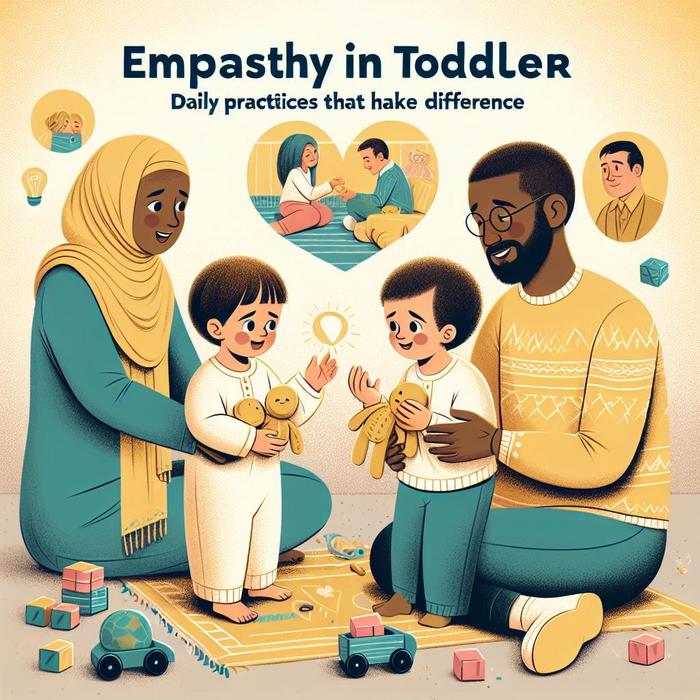Why Emphasizing Empathy is Critical in Our Toddlers
Teaching empathy to toddlers involves much more than just telling them to be kind. It constitutes a combination of emotional intelligence activities and positive behavior reinforcement, all wrapped with a consistent display of family values. But why is empathy such a crucial aspect of a toddler’s development?
The Importance of Empathy in Toddler Development
Empathy is the ability to understand and share the feelings of others. When children learn empathy, they not only understand how their actions can affect others; they also become more sensitive to others’ feelings and react kindly. Empathy can form the basis for close relationships, effective communication, and strong emotional health.
Moreover, as Developmental Science suggests, empathy is not necessarily a trait we are born with; it is a quality to be nurtured and developed.
Strategies for Teaching Empathy to Toddlers
Developing empathy in young minds is a task that requires patience, consistency, and understanding. Here are some of the daily practices that can make a difference:
– Model Empathetic Behavior: Toddlers primarily learn by watching and mimicking their parents or caregivers. When they see adults treating others kindly and empathetically, they are more likely to follow suit.
– Encourage Expression of Feelings: Helping toddlers express their feelings helps them understand emotions, which is a significant step towards developing empathy.
– Prompt Perspective-Taking: Asking toddlers how they think someone might be feeling or reacting in certain situations can help them develop an understanding of other people’s perspectives.
– Read Emotionally Intelligent Books: Books that narrate stories with lessons on kindness, sharing, and understanding can serve as excellent tools for teaching empathy.
– Use Positive Behavior Reinforcement: Praising toddlers when they show empathy towards others encourages them to repeat such behaviors.
How Daily Routines Can Instill Empathy
1. Enhance Emotional Intelligence Activities:
Develop emotional intelligence in your toddlers by engaging them in activities that require interacting with other children and sharing toys. Encourage them to express what they feel and guide them to understand what their playmates might feel.
2. Role-Playing:
Role-playing with your toddlers using their favorite toys can be a fun way to teach them about empathy. You can use different scenarios to show how each character feels and how they react, building an understanding of emotions and empathy.
3. Story Telling:
Narrating bedtime stories can be a wonderful time to instill empathy in your toddlers. Choose stories that revolve around characters showing compassion, kindness, and understanding.
4. Family Time:
Spending quality family time together lets toddlers observe and understand different emotions. It provides them with an opportunity to develop their emotional intelligence and learn about empathy.
Reinforcing Positive Behavior
Positive behavior reinforcement is a method used to increase desirable behavior by offering a reward immediately after that behavior is displayed. For instance, when a toddler shares their toy with a sibling or friend, praising them for their kindness can reinforce this behavior.
Using Family Values to Teach Empathy
Incorporating family values into daily routines can significantly contribute to teaching empathy to toddlers. For example, establishing an environment wherein understanding, respect, and kindness are valued can set the stage for empathetic behavior.
Incorporating empathy into your daily routines and interactions with your toddler is not only beneficial for their emotional intelligence but also fosters their ability to interact positively with others. As emphasized by the Attachment Parenting, forming a strong emotional bond with children by nurturing their emotional intelligence lays the foundation for their lifelong interpersonal relationships.
Teaching empathy to toddlers is no easy task, but with patience, consistency, and a dash of creativity, you can lay a solid foundation for a personality enriched with empathy, understanding, and emotional intelligence. Emphasizing empathy today will not only enable them to understand and connect with others better but will also contribute to their overall mental well-being in the long run.
Engaging Activities to Foster Empathy in Toddlers
Engaging your toddler in activities specially designed to cultivate empathy is a highly effective method of teaching this essential life skill. It comes highly recommended by child development experts like those from the Mental Health Center for Kids. Here are some activities that you can incorporate into your daily routine:
1. The Empathy Game:
Using flashcards with pictures of individuals showing various emotions, ask your toddler what emotion they think each person is feeling. This game encourages toddlers to pay attention to other people’s expressions and emotions, leading to enhanced introspection and empathy.
2. Puppet Shows:
A puppet show can illustrate scenarios that incorporate varied emotional responses. By doing so, toddlers can easily grasp what empathy looks like in everyday life when different characters reflect distinct emotions.
3. Learning Through Music:
Music not only soothes but also educates. Songs that embolden kindness, sharing, and understanding feelings can significantly contribute to developing empathy in toddlers.
4. Engaging in Community Service:
Simple acts of community service, like donating unused toys to a charity or sharing food with less fortunate neighbors, can provide actual experiences of empathy and kindness.
Anchoring Empathy within Family Values
It’s critical that we tie the concept of empathy into the deeply ingrained values of our families. This can make empathy, not merely an idea to learn, but a way of life for our toddlers. NAEYC underscores the importance of nurturing unbiased perspective among children that can further deepen the practice of empathy. By proclaiming and practicing values like respect, kindness, fairness, and responsibility, we can immerse our children in an atmosphere that primes them to treat others with empathy.
Empathy: The Pillar of Emotional and Social Intelligence
Empathy empowers our toddlers to build stronger connections with others, allowing them to express and understand emotions better. It forms the very foundation of emotional and social intelligence and becomes a guiding light for their lifelong bonds. If we take a leaf out of the Harvard Graduate School of Education’s Guide, cultivating empathy leads to nurturing individuals who are not only compassionate but also socially and emotionally intelligent.
Elevating our Toddlers’ Potential through Empathy
As parents and caregivers, our role in teaching empathy goes beyond just inculcating good manners. It involves considerably more – preparing our toddlers to be sensitive, respecting individuality, understanding differences, and marinating them in the essence of humaneness. According to the Greater Good Science Center at UC Berkeley, empathy not only helps in emotional understanding but also promotes altruistic behavior and improves overall mental health.
In this turbulent world where aggression and intolerance are unfortunately common, the gift of empathy we could impart to our toddlers is invaluable. Inscribing emphasis on understanding others’ feelings and experiences can help them become kind, comprehend diversity, and contribute to a more compassionate world.
As we consistently strive to infuse empathy into our toddlers, we empower them to traverse the journey of life with emotional intelligence, kindness, and compassion. We are not only raising toddlers; we are nurturing the architects of the future.
Teaching Empathy to Toddlers: A Step Towards Raising Compassionate Individuals
––>







